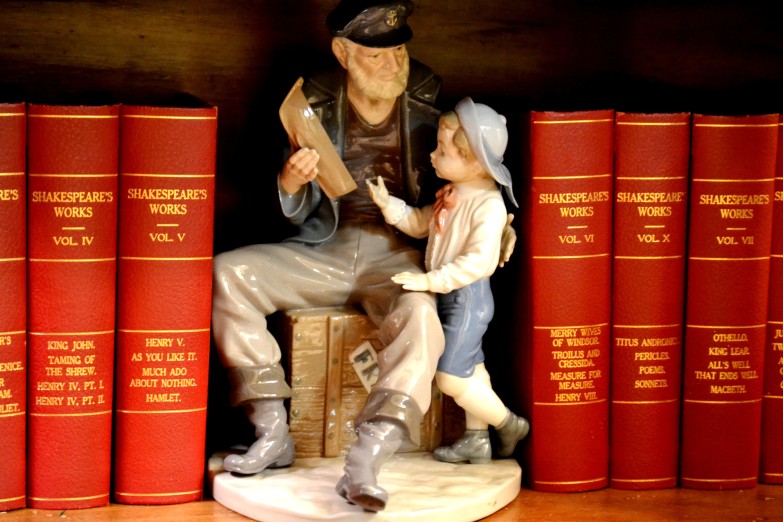The Value of Things
When I was fourteen, my entire freshman English lit class watched the movie Romeo & Juliet together. Some of the kids in my class teased me about looking a little like Juliet and for the next week they added an extra “et” to the end of my name to make it three syllables so it rhymed with hers. I laughed and rolled my eyes, but I was secretly honored by the comparison.
Later that summer after the school year ended, my great grandmother passed away and my family inherited her antiques. There were several, including a Victrola phonograph (complete with side crank, steel needles and 78 RPM record albums) and lots of English china. But what I remember most was the vintage maple bookcase that came with a gold skeleton key to unlock the treasures behind its curved glass door. Inside, it was filled with books, some that were over a hundred years old.
One set of books with red and gold covers and gilded pages stood apart from the others on the bottom shelf. My mother — a huge reader and lover of all things related to words — was very excited to tell me about them because they were a rare first edition. Not only that – they were complete. The complete works of… you guessed it. Shakespeare.
And so one day that summer when it was too hot to do anything else, I stayed indoors in our air conditioned den and settled into a recliner with Act II, Scene II, Capulet’s orchard opened in my lap. I was determined by the end of the afternoon to have the entire balcony scene memorized. I just wanted to prove to myself that I could do it. I honestly thought if I could memorize that scene, I could probably do just about anything. And I did it. I may have substituted a word here or there, but I got the essence of it.
Above the shelf with the works of Shakespeare I found an old family bible. One in which my great, great, great grandmother listed all the names of her children. She’d had seven, yet only two survived beyond the age of nine. Beside each of their handwritten names were the sad causes of death: “stillborn,” “polio,” “fever.” It was sobering to see how much harder life had been for my ancestors and I found a whole new appreciation for my own life.
It seems we value more the things we’ve had to work for, fight for, suffer for. Romeo and Juliet died for their love. Shakespeare worked tirelessly on his art. My great, great, great grandmother birthed seven children to put the odds in her favor that two would survive.
Sometimes what we value gets lost or broken, but without this possibility, would we even value it so much to begin with? I’m thinking probably not. And as Shakespeare himself would say, therein lies the… irony. Or something like that.
